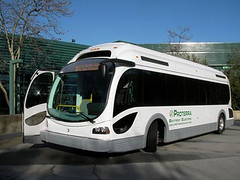  Above: A traditional electric trolley bus in San Francisco. Below: GM’s wireless electric bus prototype. |
Electric buses offer many advantages over traditional fossil fuel buses, but they are more expensive and difficult to run. A new model by General Motors may bring them to the mainstream.
The most obvious advantage of electric buses is environmental, but the fact that they don’t spew any harmful gases into the atmosphere is hardly the only benefit. Electric buses are also quieter and smoother to ride than fossil fuel buses, resulting in a more comfortable experience for riders and fewer negative effects to the neighborhoods buses travel through.
Traditionally to run an all electric bus a transit agency had to install overhead wires. This can actually be an advantage as well, since it displays a sense of permanence to the transit line, which gives trolley buses some of the same economic development advantages of actual trolleys. On the other hand, wires can also be a big negative, both visually and fiscally. Installing and maintaining overhead wires adds so much to the cost of running a transit line that very few cities in the US use them.
But what if it were possible to run an electric bus without the wires? You’d lose that permanence advantage, but the environmental, comfort, and noise advantages would all still apply. And if, after all, wireless streetcars are being developed, why shouldn’t a wireless bus be possible too?
It turns out General Motors is working on one, along with a Colorado-based company called Proterra. Their EcoRide BE-35 model bus is fully electric and runs on lithium-ion battery packs that give it a 40-mile range for every 10-minute charge. The 35-foot, low floor bus design is basically comparable to normal city buses otherwise.
The website doesn’t include many details that will have to be addressed before very many transit agencies pony up money (such as whether the bus can run air conditioning), but if they can make the idea work it has potential to revolutionize urban busing.








